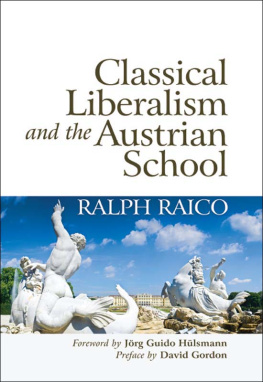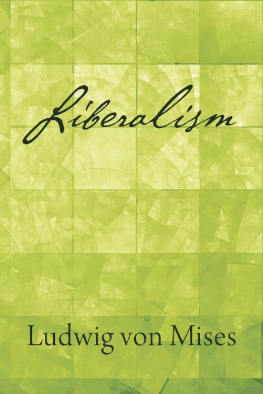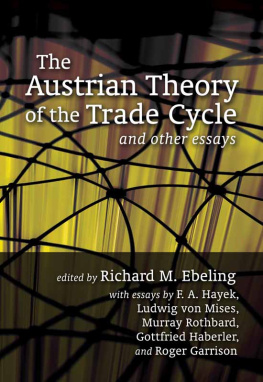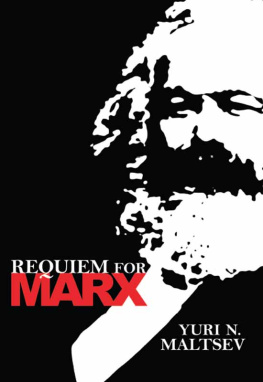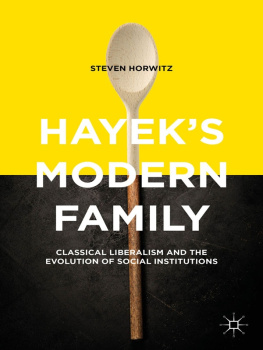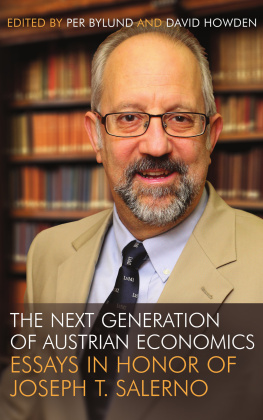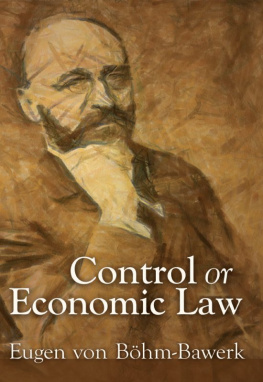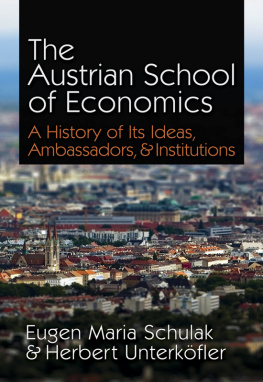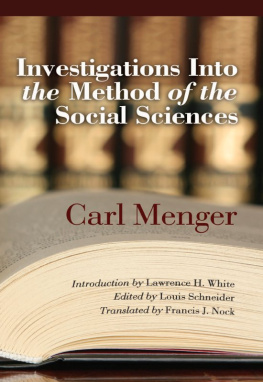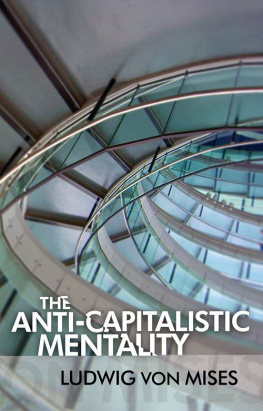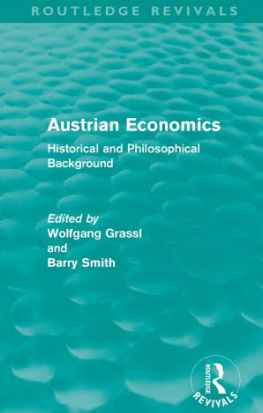Classical Liberalism and the Austrian School
Classical Liberalism
and the Austrian School
Ralph Raico
Foreword by
Jrg Guido Hlsmann
Preface by
David Gordon
LvMI
MISES INSTITUTE

The cover design by Chad Parish shows the Neptune Fountain, at the Schnbrunn Palace, in Vienna.
Copyright 2012 by the Ludwig von Mises Institute. Permission to reprint in whole or in part is gladly granted, provided full credit is given.
Ludwig von Mises Institute
518 West Magnolia Avenue
Auburn, Alabama 36832
mises.org
ISBN: 978-1-61016-003-2
Dedicated to the memory of the great Ludwig von Mises
Table of Contents
Foreword
History looks backward into the past, but the lesson it teaches concerns things to come. It does not teach indolent quietism; it rouses man to emulate the deeds of earlier generations.
Ludwig von Mises
The present book contains a collection of essays written throughout the past twenty years. I read virtually all of them when they were first published. They have been a central part of my education in the history of liberalism and of the Austrian School of economics, and I consider myself privileged indeed to have encountered Professor Raico and his work early on in my intellectual development.
Raicos profound and extensive knowledge of intellectual, political, and economic history are evident in each of the following essays and, in fact, virtually on each page of this book. His readers will also appreciate the warm passion he brings to the study of his subject, as well as his dry wit. Drawing from original sources in German, French, and Italian, as well as English, Professor Raico provides us with original scholarship on the history of liberalism from a decidedly liberal, though not exclusively Anglo-Saxon perspective. What is more, he definitely has the talent to rouse his readers to emulate the deeds of earlier generations. It was through Raicos book Die Partei der Freiheit (The that I and many other Germans first heard of Eugen Richter, the champion of true liberalism in fin de sicle Germany. Forgotten by virtually everyone except for his social-democratic detractors, Richter has made a comeback in the past ten years and some of his major writings are again in print. Today his words and deeds inspire a new generation of intellectuals and politicians. Thank you for that lesson, Professor Raico! If Germany returns to the tradition of true liberalism, we shall have in Berlin a Raico Strae leading to the Richter Platz.
Ralph Raicos scholarship did not just appear out of the blue sky. It is the fruit of hard work, and it is also based on the work of predecessors and contemporaries. Ralph Raico adds to the legacy of his mentor, Ludwig von Mises, who was himself a distinguished historian and to whose memory the present volume is dedicated. They first met when Raico was still a high-school student in the early 1950s and when despite his young age he was admitted to Mises NYU seminar. There he met Murray Rothbard and many other young intellectuals who in the decades to come would turn into pillars of true liberalism. In the Mises seminar these young men would receive a lesson on the meaning of scholarship. A scholar is not a living inventory of a great number of loosely connected facts, or the crafty technician of some sophisticated method of research, or a member of the order of discourse (Foucault) whose main ability is to handle the abstract language of an intellectual sect. A scholar definitely is a master of the nuts and bolts. He is perfectly familiar with all the relevant facts and methods, and he is conversant even with the latest fads of terminology. But, more than that, he truly penetrates his subject. He can explain his facts in terms of cause and consequence rather than merely juxtaposing them. He sees through terminological fads and writes in an unpretentious style, because he does not seek to impress, but to transmit. And he is able to transcend the necessarily narrow realm of any scientific investigation. He is able to put the concrete subjects of his field, and the field itself, into proper context and perspective. He is able to open horizons.
These are the marks of scholarship that we find in the works of Ludwig von Mises and of Murray Rothbard. These are also the marks that we find on the following pages. Professor Raico covers all aspects of his field: deeds, persons, and ideas. But he is not just a historian, but a great educator within a great tradition.
Jrg Guido Hlsmann
Angers, France
November 2011
________________
Ludwig von Mises, Theory and History (New Haven: Yale University Press, 1957), p. 294.
Preface
Ralph Raico in this brilliant book calls to our attention the dictum of Augustin Thierry: The great precept that must be given to historians is to distinguish instead of confounding (p. 136). Thierry, as Raico shows, did not always follow his own advice; but the remark perfectly describes the historical writing of Raico himself. He is master of the fine discriminations that F.R. Leavis thought essential to the task of the critic. His profound scholarship and keen intelligence make him a great historian. Indeed, he is our foremost historian of classical liberalism.
Raico begins his work of conceptual clarification by asking, what is classical liberalism; or, better, what is liberalism, since only the classical variety qualifies as liberalism properly so called. [T]here was no classical liberalism, only a single liberalism, based on private property and the free market, that developed organically, from first to last. (p. 1)
Raico answers his definitional question in the books initial chapter, Classical Liberalism and the Austrian School. Liberals believe that the main institutions of society can function in entire independence of the state: Liberalism... is based on the conception of civil society as by and large self-regulating when its members are free to act within the very wide bounds of their individual rights. Among these, the right to private property, including freedom of contract and exchange and the free disposition of ones own labor, is given a high priority. Historically, liberalism has manifested a hostility to state action, which, it insists, should be reduced to a minimum. (p. 2)
Liberalism, so defined, seems to have an obvious affinity with Austrian economics. But here a problem arises: is not Austrian economics a value-free science? Adherence to liberalism, obviously, entails value judgments. The relation between them, then, cannot be that the economic theory logically implies the political doctrine. Indeed, enemies of classical liberalism have at times embraced tenets of the Austrians. The Fabian Socialist George Bernard Shaw, influenced by Philip Wicksteed, accepted the subjective theory of value; and, Raico notes, the analytical Marxist Jon Elster finds Marxism compatible with methodological individualism. Nevertheless, Raico claims: On the level of policy, Austrianisms individualist and subjectivist methodology tends, indirectly at least, to sway decisions in a liberal direction. (p. 8)

